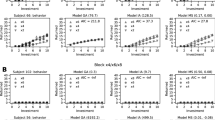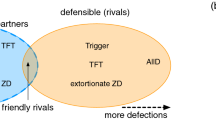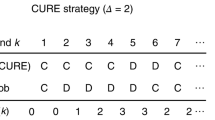Abstract
The claim by Johnson et al. that human cooperation in social-dilemma games violates rational-choice theory is not justified1. If people have altruistic aims, altruistic behaviour is a rational means by which to achieve their proximate goals. From an evolutionary viewpoint, we need to explain why humans are often altruistic by strong reciprocity2,3,4. Although kin selection, reciprocal altruism and indirect reciprocity explain relevant forms of human cooperation5,6,7, they do not ultimately explain strong reciprocity8.
Similar content being viewed by others
Fehr and Gächter reply
Kin selection would account for strong reciprocity if human behaviour were driven by rules that do not distinguish between kin and non-kin. But humans, like other primates, distinguish cognitively and behaviourally between the two5,9, and generally feel stronger emotions towards kin. Likewise, reciprocal altruism could account for strong reciprocity if humans' behavioural rules did not depend on the probability of future interactions with potential opponents. But humans can distinguish long-term partners from people with whom future interaction will be less likely ('strangers'), and will cooperate more if they anticipate that interaction will be frequent6. Emotional responses may also be stronger towards a long-term partner than towards a 'stranger' (our unpublished results).
Reputation-based ultimate theories could account for strong reciprocity if our behavioural rules did not depend on our actions being observed by others. However, if reputation formation is ruled out, cooperation breaks down, whereas it flourishes if subjects gain in reputation7.
Early humans whose behaviour was fine-tuned to respond to kin or non-kin, partners or strangers, and gaining in reputation, probably had an evolutionary advantage because, contrary to common belief, they faced interactions where the probability of future encounters was sufficiently low as to make defection worthwhile. Ethnographic evidence indicates that humans had many encounters with individuals with whom they had little future interaction8. In addition, the costs of mistakenly treating unrelated individuals as kin, or treating strangers as partners, were high — for instance, a lack of vigilance with strangers could be fatal. Because of these costs, individuals who could adjust their behaviour to suit the their opponent's characteristics had greater fitness. The problem with any theory claiming that strong reciprocity is maladaptive in modern circumstances is that individuals understand the risks of exploitation in interactions with non-kin and strangers, and behave accordingly. An evolutionary explanation of strong reciprocity is needed that does not assume that individuals are maladapted2,3.
A proximate mechanism of belief in supernatural punishment does not solve the evolutionary puzzle. How could such beliefs evolve if those who did not hold them defected and hence gained an advantage? Laboratory experiments do not support the claim that religion is important for cooperation. If other people in the group are expected to defect, then almost everyone else — religious or not — will defect too10. Moreover, in almost all religions, non-believers have been ostracized and have faced worldly punishment.
We do not agree that anonymity is a problem in the experiment: it rules out other, less costly forms of social punishment that are available in non-anonymous situations, such as workers' hostility towards strike-breakers and people's hostility towards wartime deserters. If non-anonymous punishment were lessened by being more costly, this could be just another example of how remarkable humans are at fine-tuning their behaviour to suit their circumstances.
References
Gintis, H. Game Theory Evolving (Princeton Univ. Press, 2000).
Henrich, J. & Boyd, R. J. Theor. Biol. 208, 79–89 (2001).
Gintis, H. J. Theor. Biol. 206, 169–179 (2000).
Fehr, E. & Gächter, S. Nature 415, 137–140 (2002).
Silk, J. B. Am. Anthropol. 82, 799–820 (1980).
Gächter, S. & Falk, A. Scand. J. Econ. 104, 1–25 (2002).
Milinski, M., Semmann, D. & Krambeck, H. J. Nature 415, 424–426 (2002).
Fehr, E. & Henrich, J. in The Genetic and Cultural Evolution of Cooperation (ed. Hammerstein, P.) (MIT Press, Cambridge, Massachusetts, in the press).
Tomasello, M. & Call, J. Primate Cognition (Oxford Univ. Press, New York, 1997).
Fischbacher, U., Gächter, S. & Fehr, E. Econ. Lett. 71, 397–404 (2001).
Author information
Authors and Affiliations
Corresponding author
Rights and permissions
About this article
Cite this article
Fehr, E., Gächter, S. The puzzle of human cooperation. Nature 421, 912 (2003). https://doi.org/10.1038/421912a
Issue Date:
DOI: https://doi.org/10.1038/421912a
This article is cited by
-
Quantitative determination of the level of cooperation in the presence of punishment in three public good experiments
Journal of Economic Interaction and Coordination (2008)
-
Nonhuman Species’ Reactions to Inequity and their Implications for Fairness
Social Justice Research (2006)
-
God’s punishment and public goods
Human Nature (2005)
Comments
By submitting a comment you agree to abide by our Terms and Community Guidelines. If you find something abusive or that does not comply with our terms or guidelines please flag it as inappropriate.



